-
 Bitcoin
Bitcoin $84,113.0667
-0.50% -
 Ethereum
Ethereum $1,603.3872
-0.80% -
 Tether USDt
Tether USDt $1.0000
0.02% -
 XRP
XRP $2.1214
-0.30% -
 BNB
BNB $583.1191
-0.38% -
 Solana
Solana $128.3486
-0.41% -
 USDC
USDC $0.9999
0.01% -
 TRON
TRON $0.2507
-0.43% -
 Dogecoin
Dogecoin $0.1560
-1.08% -
 Cardano
Cardano $0.6175
-2.34% -
 UNUS SED LEO
UNUS SED LEO $9.3641
-0.39% -
 Chainlink
Chainlink $12.4044
-1.53% -
 Avalanche
Avalanche $19.4189
-3.30% -
 Stellar
Stellar $0.2411
1.31% -
 Toncoin
Toncoin $2.9373
2.66% -
 Shiba Inu
Shiba Inu $0.0...01179
-1.31% -
 Sui
Sui $2.1242
-2.42% -
 Hedera
Hedera $0.1580
-4.01% -
 Bitcoin Cash
Bitcoin Cash $323.7953
-0.16% -
 Litecoin
Litecoin $76.0133
-0.95% -
 Polkadot
Polkadot $3.5856
-2.67% -
 Dai
Dai $1.0000
0.01% -
 Bitget Token
Bitget Token $4.2780
0.01% -
 Hyperliquid
Hyperliquid $15.3739
-1.78% -
 Ethena USDe
Ethena USDe $0.9992
0.02% -
 Pi
Pi $0.6465
-11.86% -
 Monero
Monero $214.5536
0.11% -
 Uniswap
Uniswap $5.2468
-1.95% -
 OKB
OKB $51.0834
-3.34% -
 Pepe
Pepe $0.0...07010
-3.44%
How to prevent cloud server mining from being hacked?
To secure cloud server mining, choose a reputable provider, implement strong access controls, update software regularly, and use encryption and intrusion detection systems.
Apr 14, 2025 at 10:56 pm
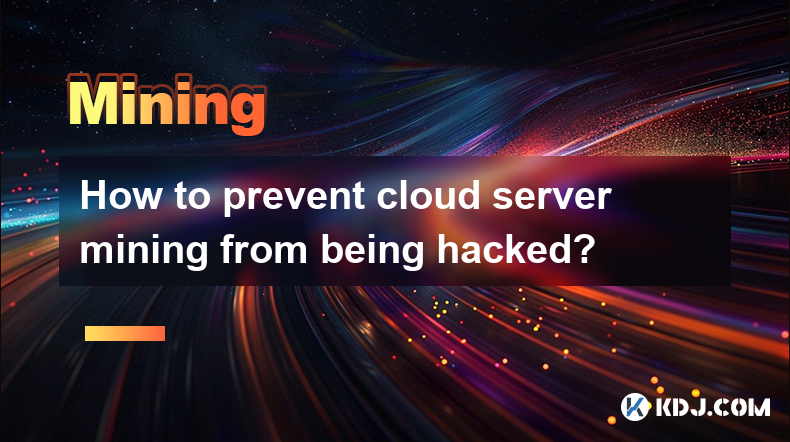
In the realm of cryptocurrency, cloud server mining represents a significant investment for many enthusiasts and professionals alike. However, the security of these servers is paramount, as they are prime targets for hackers looking to exploit vulnerabilities and steal valuable digital assets. This article will explore various strategies to safeguard your cloud server mining operations from being hacked, ensuring that your investments remain secure.
Understanding the Risks
Before diving into the preventive measures, it's crucial to understand the common risks associated with cloud server mining. Hackers often target cloud servers due to the potential for high rewards. They may attempt to gain unauthorized access through various methods such as brute force attacks, exploiting software vulnerabilities, or phishing attempts. Additionally, insufficient security measures on the part of the cloud service provider can leave your servers vulnerable to attacks.
Choosing a Secure Cloud Service Provider
The first step in securing your cloud server mining operations is to select a reputable and secure cloud service provider. Look for providers that offer robust security features, such as encryption, multi-factor authentication, and regular security audits. It's also beneficial to review the provider's track record for security breaches and their response to such incidents. Providers with a strong commitment to security are more likely to protect your mining operations effectively.
Implementing Strong Access Controls
Access control is a critical aspect of securing your cloud servers. Implement strong password policies that require complex passwords and regular updates. Additionally, enable multi-factor authentication (MFA) for all users accessing the cloud server. MFA adds an extra layer of security by requiring a second form of verification, such as a text message or an authentication app, before granting access.
Regularly Updating and Patching Software
Software vulnerabilities are a common entry point for hackers. To mitigate this risk, ensure that all software on your cloud servers is regularly updated and patched. This includes the operating system, mining software, and any other applications running on the server. Set up automatic updates where possible, and manually check for updates regularly to stay ahead of potential vulnerabilities.
Monitoring and Logging
Continuous monitoring and logging are essential for detecting and responding to security incidents. Implement a robust logging system that records all access attempts, changes, and other relevant activities on your cloud servers. Use monitoring tools to alert you to suspicious activities in real-time. Regularly review logs to identify patterns that may indicate a security breach.
Securing Network Connections
Securing the network connections to your cloud servers is another vital aspect of preventing hacks. Use secure communication protocols such as SSH (Secure Shell) and SSL/TLS (Secure Sockets Layer/Transport Layer Security) for all data transmissions. Additionally, configure firewalls to restrict incoming and outgoing traffic to only necessary ports and IP addresses. This helps to minimize the attack surface and protect against unauthorized access.
Educating and Training Staff
Human error is often a significant factor in security breaches. Educate and train all staff members involved in your cloud server mining operations on best practices for security. This includes training on how to recognize and avoid phishing attempts, the importance of strong passwords, and the proper handling of sensitive information. Regular training sessions can help reinforce these practices and keep your team vigilant against potential threats.
Encrypting Data
Data encryption is a powerful tool for protecting your mining operations. Encrypt all data stored on your cloud servers, including configuration files, mining data, and any other sensitive information. Use strong encryption algorithms and ensure that encryption keys are securely managed and protected. Encrypted data is much harder for hackers to exploit, even if they manage to gain access to your servers.
Implementing Intrusion Detection and Prevention Systems
Intrusion detection and prevention systems (IDPS) can significantly enhance the security of your cloud servers. Deploy an IDPS to monitor network traffic for signs of malicious activity and automatically respond to detected threats. These systems can help prevent attacks before they cause significant damage and provide valuable insights into potential security weaknesses.
Regular Security Audits
Conducting regular security audits is essential for maintaining the security of your cloud server mining operations. Perform comprehensive audits to assess the effectiveness of your security measures and identify any vulnerabilities. Use the findings from these audits to make necessary improvements and keep your security strategy up to date. Consider hiring external security experts to conduct these audits for an unbiased assessment.
FAQs
Q: Can I use a virtual private network (VPN) to enhance the security of my cloud server mining operations?
A: Yes, using a VPN can add an extra layer of security by encrypting your internet connection and masking your IP address. This can help protect against man-in-the-middle attacks and other forms of network interception. However, a VPN should be used in conjunction with other security measures, not as a standalone solution.
Q: How often should I update my cloud server's software and security patches?
A: It's recommended to update your cloud server's software and apply security patches as soon as they become available. Many providers offer automatic updates, but you should also manually check for updates at least once a week to ensure you're protected against the latest vulnerabilities.
Q: What should I do if I suspect my cloud server has been hacked?
A: If you suspect your cloud server has been hacked, take immediate action by disconnecting the server from the internet to prevent further damage. Then, contact your cloud service provider and report the incident. Conduct a thorough investigation to understand the nature of the breach and take steps to secure your server before reconnecting it.
Q: Are there any specific tools or services that can help monitor and secure my cloud server mining operations?
A: Yes, there are several tools and services designed to enhance the security of cloud servers. Some popular options include intrusion detection systems like Snort, security information and event management (SIEM) tools like Splunk, and cloud security platforms like AWS Security Hub. Choose tools that align with your specific needs and integrate well with your existing infrastructure.
Disclaimer:info@kdj.com
The information provided is not trading advice. kdj.com does not assume any responsibility for any investments made based on the information provided in this article. Cryptocurrencies are highly volatile and it is highly recommended that you invest with caution after thorough research!
If you believe that the content used on this website infringes your copyright, please contact us immediately (info@kdj.com) and we will delete it promptly.
- Bitcoin (BTC) price reaches a daily high of $86429
- 2025-04-16 06:05:13
- Wall Street's Recession Sirens Are Blaring — and Bitcoin's BTC/USD Defiant Rally Has Investors Asking: Is This Digital Gold 2.0?
- 2025-04-16 06:05:13
- Coinbase (COIN) Drops 100+ Crypto Assets from Custody Service
- 2025-04-16 06:00:12
- Mantra (OM) Coin Price is Putting Hope in Investors' Eyes After Crashing 90% Few Days Ago
- 2025-04-16 06:00:12
- Bitcoin (BTC) Just Days Away From Confirming Major Bullish Breakout, Says Crypto Analyst
- 2025-04-16 05:55:12
- USDC (USDC), CCTP v2 and Circle Wallets Will Launch on Monad's Mainnet When It Goes Live
- 2025-04-16 05:55:12
Related knowledge
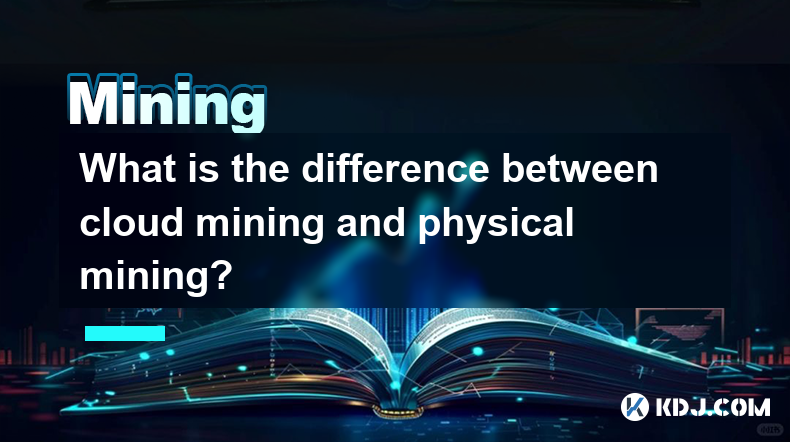
What is the difference between cloud mining and physical mining?
Apr 16,2025 at 01:49am
What is the difference between cloud mining and physical mining? In the world of cryptocurrencies, mining is the process by which new coins are generated and transactions are verified and added to the blockchain. There are two primary methods of mining: cloud mining and physical mining. Understanding the differences between these two approaches can help...
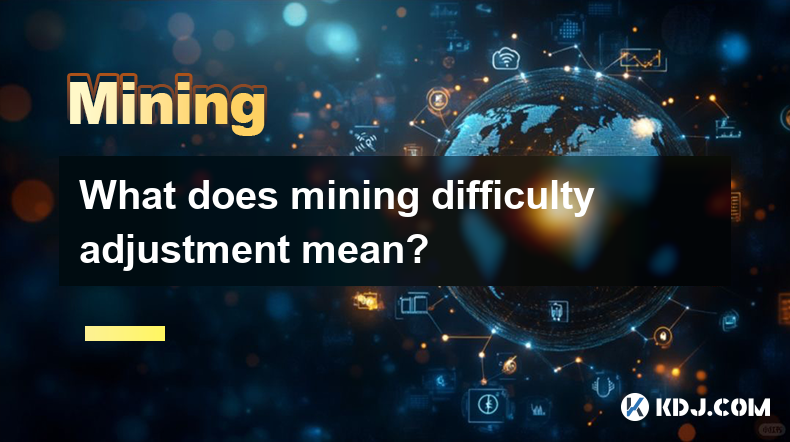
What does mining difficulty adjustment mean?
Apr 16,2025 at 12:42am
What does mining difficulty adjustment mean? Mining difficulty adjustment is a crucial mechanism in blockchain networks, particularly in Proof of Work (PoW) systems like Bitcoin. It ensures that the rate at which new blocks are added to the blockchain remains consistent, despite fluctuations in the total computational power (hash rate) of the network. T...
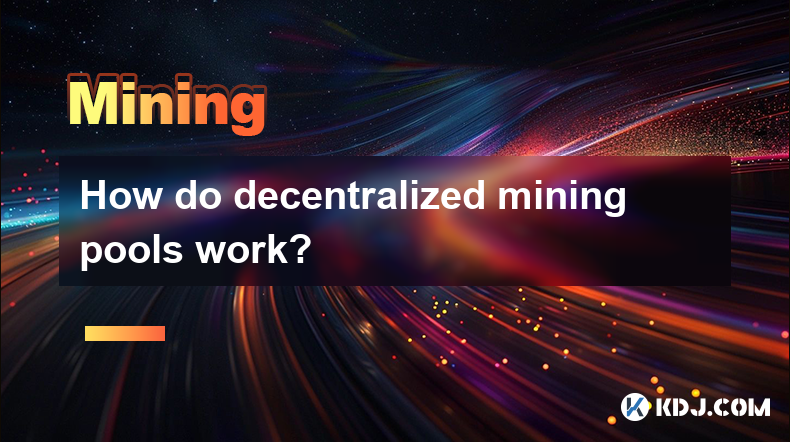
How do decentralized mining pools work?
Apr 16,2025 at 05:42am
Decentralized mining pools represent a significant evolution in the world of cryptocurrency mining, offering a more democratic and transparent approach compared to traditional centralized pools. In this article, we will explore the mechanics of decentralized mining pools, their benefits, and how they operate within the cryptocurrency ecosystem. What are...
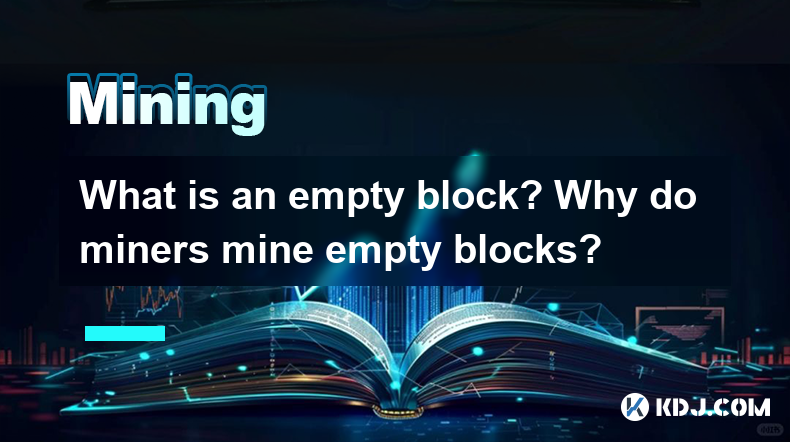
What is an empty block? Why do miners mine empty blocks?
Apr 16,2025 at 01:28am
What is an Empty Block?An empty block in the context of blockchain technology, particularly in cryptocurrencies like Bitcoin, refers to a block that contains no transactions other than the coinbase transaction. The coinbase transaction is a special transaction in which new bitcoins are generated and awarded to the miner who successfully mines the block....
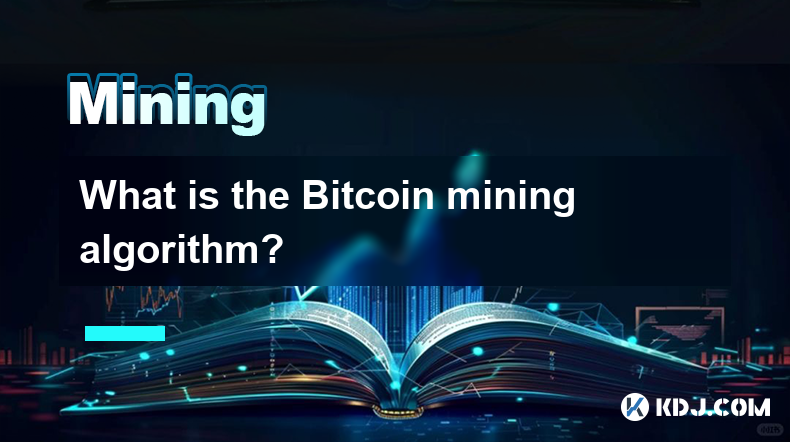
What is the Bitcoin mining algorithm?
Apr 15,2025 at 08:00pm
What is the Bitcoin Mining Algorithm? Bitcoin mining is a crucial process that maintains the integrity and security of the Bitcoin network. At the heart of this process lies the Bitcoin mining algorithm, which is responsible for verifying transactions and adding them to the blockchain. Understanding this algorithm is essential for anyone interested in t...
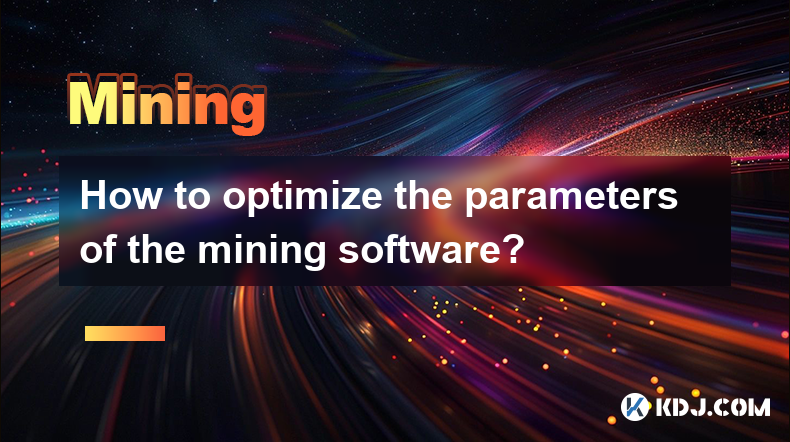
How to optimize the parameters of the mining software?
Apr 15,2025 at 10:43pm
Optimizing the parameters of mining software is crucial for maximizing efficiency and profitability in cryptocurrency mining. The process involves fine-tuning various settings to ensure that your mining operations run smoothly and effectively. In this article, we will explore the steps and considerations involved in optimizing the parameters of your min...

What is the difference between cloud mining and physical mining?
Apr 16,2025 at 01:49am
What is the difference between cloud mining and physical mining? In the world of cryptocurrencies, mining is the process by which new coins are generated and transactions are verified and added to the blockchain. There are two primary methods of mining: cloud mining and physical mining. Understanding the differences between these two approaches can help...

What does mining difficulty adjustment mean?
Apr 16,2025 at 12:42am
What does mining difficulty adjustment mean? Mining difficulty adjustment is a crucial mechanism in blockchain networks, particularly in Proof of Work (PoW) systems like Bitcoin. It ensures that the rate at which new blocks are added to the blockchain remains consistent, despite fluctuations in the total computational power (hash rate) of the network. T...

How do decentralized mining pools work?
Apr 16,2025 at 05:42am
Decentralized mining pools represent a significant evolution in the world of cryptocurrency mining, offering a more democratic and transparent approach compared to traditional centralized pools. In this article, we will explore the mechanics of decentralized mining pools, their benefits, and how they operate within the cryptocurrency ecosystem. What are...

What is an empty block? Why do miners mine empty blocks?
Apr 16,2025 at 01:28am
What is an Empty Block?An empty block in the context of blockchain technology, particularly in cryptocurrencies like Bitcoin, refers to a block that contains no transactions other than the coinbase transaction. The coinbase transaction is a special transaction in which new bitcoins are generated and awarded to the miner who successfully mines the block....

What is the Bitcoin mining algorithm?
Apr 15,2025 at 08:00pm
What is the Bitcoin Mining Algorithm? Bitcoin mining is a crucial process that maintains the integrity and security of the Bitcoin network. At the heart of this process lies the Bitcoin mining algorithm, which is responsible for verifying transactions and adding them to the blockchain. Understanding this algorithm is essential for anyone interested in t...

How to optimize the parameters of the mining software?
Apr 15,2025 at 10:43pm
Optimizing the parameters of mining software is crucial for maximizing efficiency and profitability in cryptocurrency mining. The process involves fine-tuning various settings to ensure that your mining operations run smoothly and effectively. In this article, we will explore the steps and considerations involved in optimizing the parameters of your min...
See all articles























































































